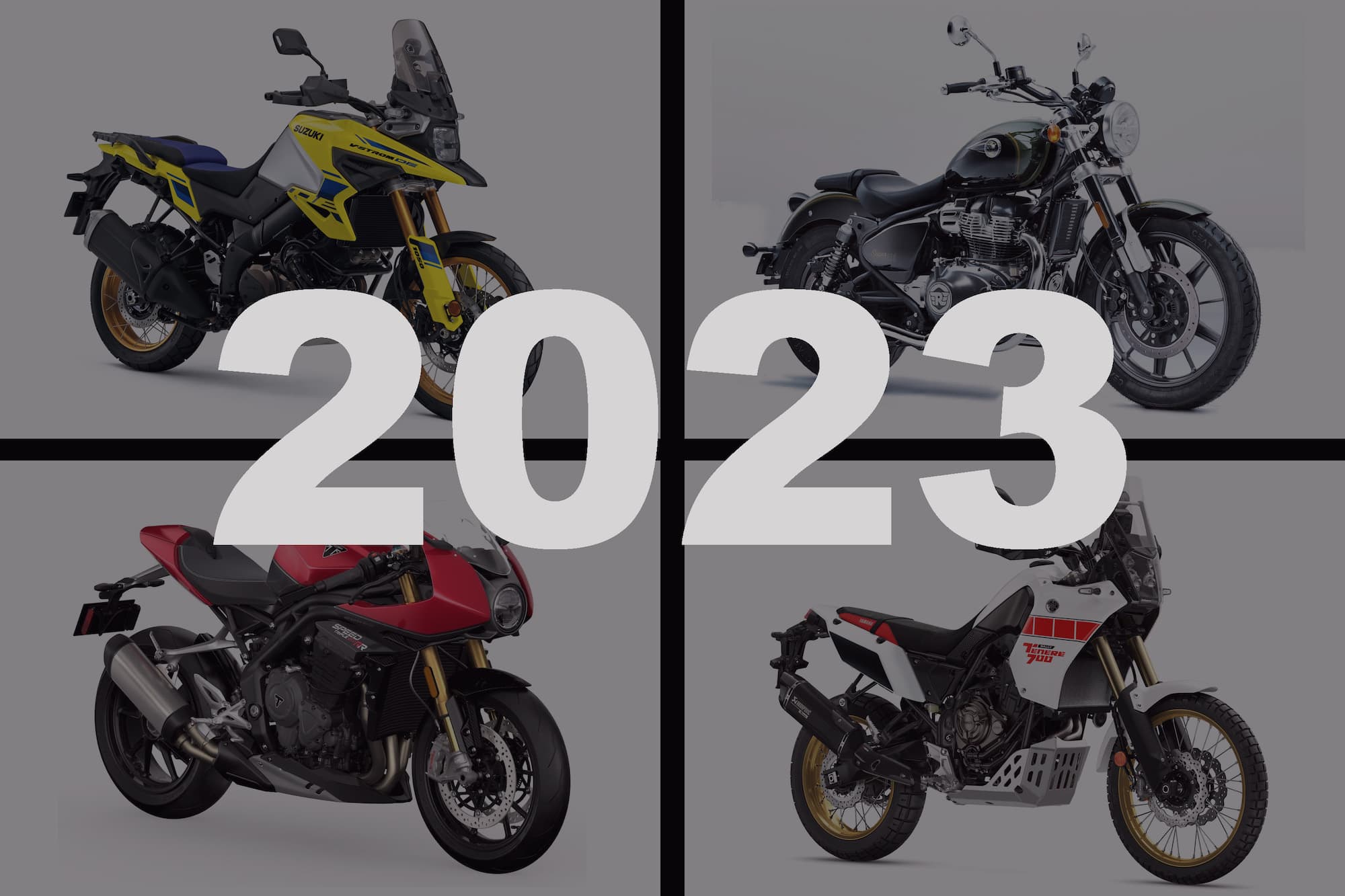Meet the Daring Father and Daughter Defying Stereotypes About Pakistan
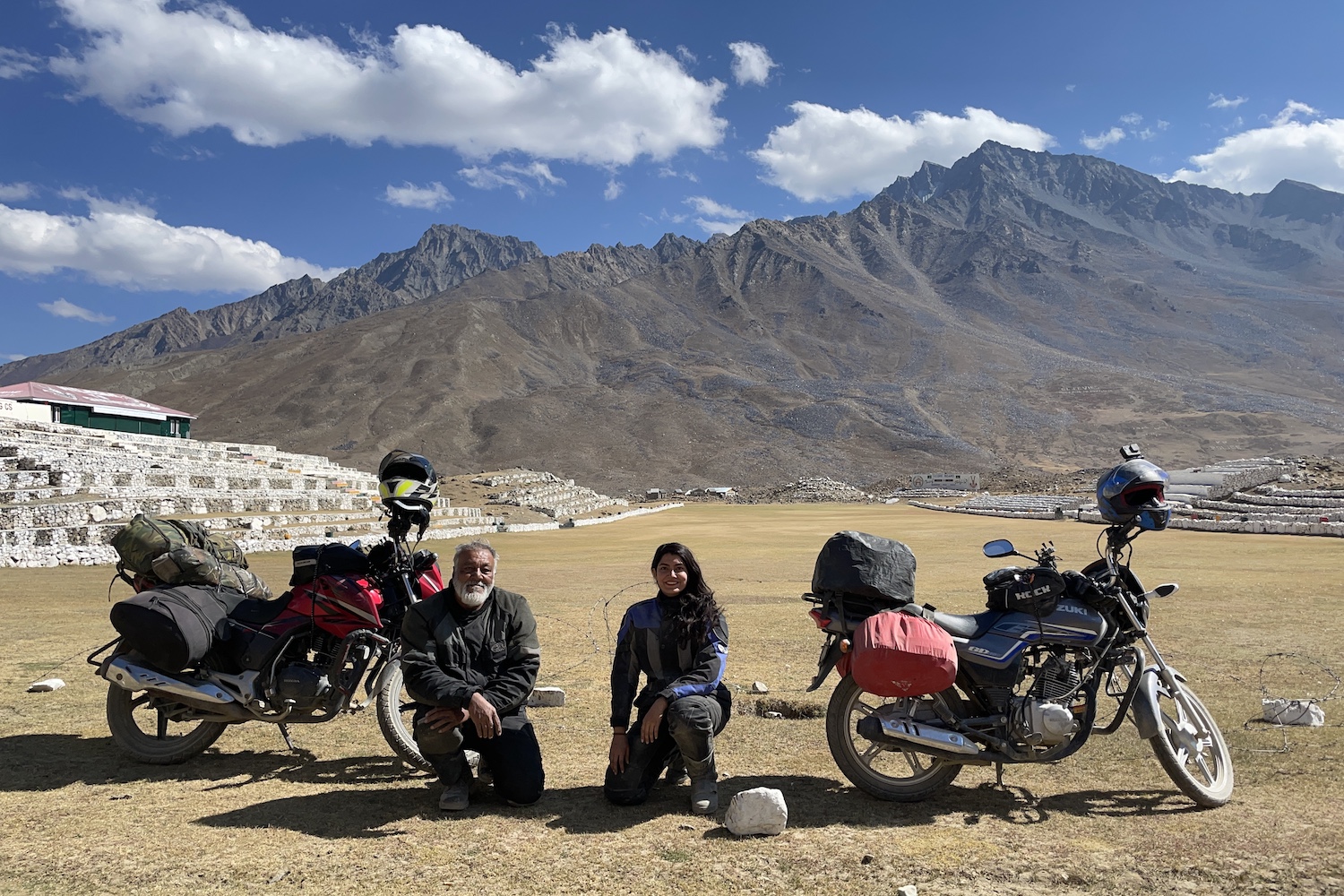
Ghar ki murgi daal barabar.
My conversation with bikers Ghazal Farooqi and her father Qazi Farooqi starts with a popular Pakistani saying that essentially translates to “not valuing what is in one’s own home,” which Qazi cites as the reason for the relative lack of domestic tourism in the country. While most Pakistanis with discretionary income opt to holiday in the likes of Dubai and London, the father-daughter duo frequently escape the noisy southern city of Karachi for the serenity of the north. But more on that later.
Pakistan is a country that has certainly caught the eyes of travel editors worldwide in recent years. In 2010, Lonely Planet dubbed Pakistan, “tourism’s ‘next big thing’ for more years than we care to remember.” Forbes listed Pakistan as one of “The 10 Coolest Places to Go in 2019.” And the historic walled city of Lahore was among the “52 Places to Love in 2021,” according to The New York Times. And rightfully so. With the majestic Karakoram mountain range in the north, vast swathes of desert in the south, storied bodies of water like the Indus River, and a myriad of UNESCO cultural sites like Taxila and Lahore Fort, Pakistan boasts an abundance of riches. Yet, the country is still untouched by mass tourism because of its international image, one that’s synonymous with political turmoil and religious extremism. Passionate about promoting the beauty of their country, Ghazal and Qazi are doing their part to change such negative perceptions, highlighting the country’s tourism potential and avowing that it’s safer than international media lets on.
It’s thanks to public figures like them, as well as Western travel vloggers like Peter Santenello and Eva zu Beck, that tourism — adventure tourism in particular — is slowly on the rise. “I’ve often encountered foreigners on my travels, and they were very content to be here,” Qazi says. “But the problem is that it takes only one incident, one mishap, for Pakistan to make headlines. The positive interactions go unnoticed. Those who do visit always report that people in places like Kashmir, Gilgit-Baltistan and Balochistan are incredibly welcoming. That has been not only our experience, but also [that of] my fellow riders.”
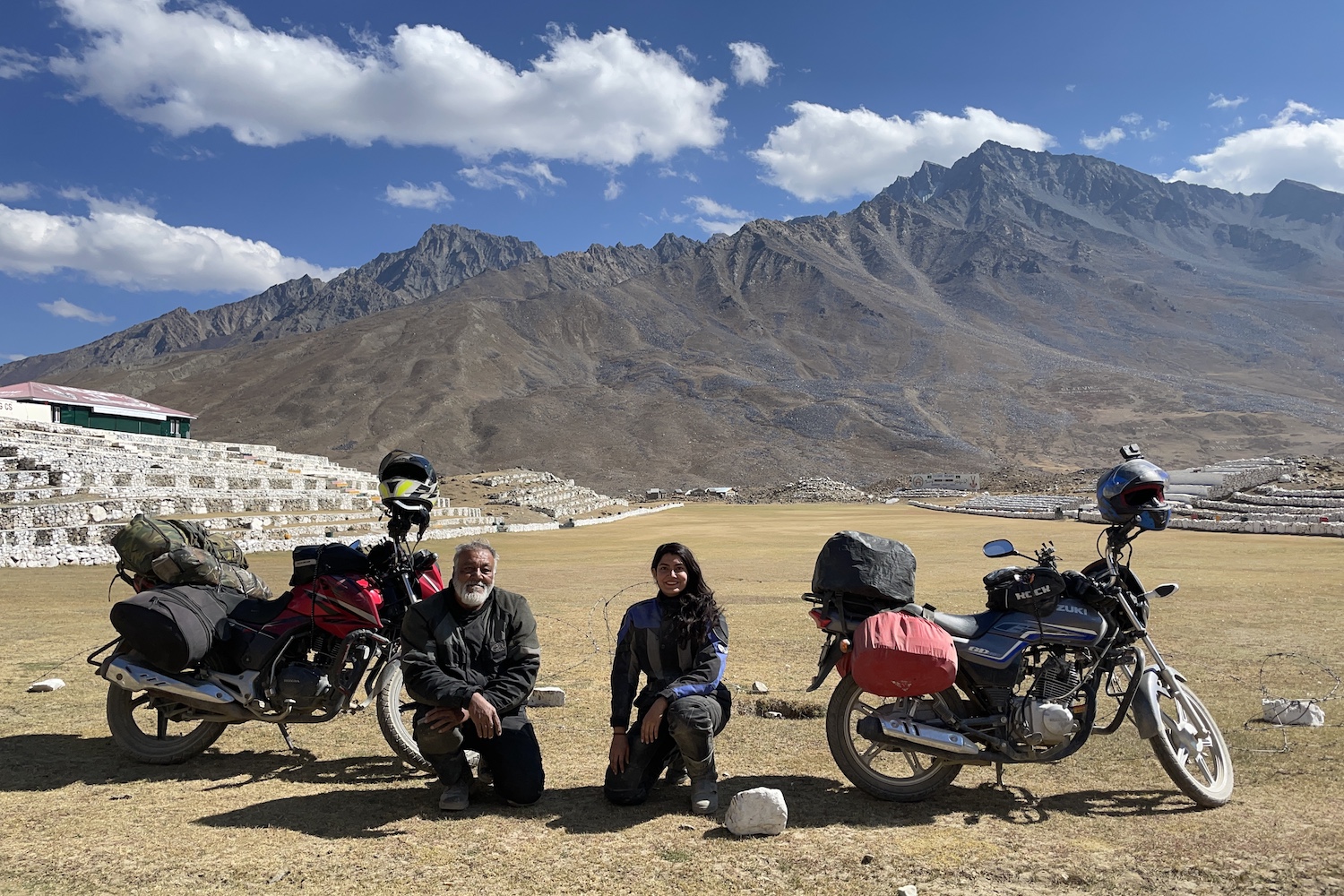
Qazi and Ghazal Farooqi
Qazi and Ghazal’s preferred way to see their home country is by riding motorcycles, as it truly allows them to explore Pakistan’s natural wonders without the burden of windows or walls in their way. “Motorbikes align perfectly with the human condition,” Qazi says. “We’re free-spirited, and we don’t like confinement. Truthfully, I feel like a prisoner when I’m driving my car or riding a bus. In contrast, I feel very independent — and emotional — when I’m on my bike because I love nature. The broad vision allows me to better appreciate our hills, our rivers, our forests.” Echoing his sentiments, Ghazal adds, “Bikes give you a sense of freedom like nothing else, especially amongst the striking landscapes of Pakistan. That feeling of the wind on my face isn’t possible sitting inside a car.”
The duo’s inaugural journey took place in 2020 as they traversed the country during a span of 11 days and nearly 5,000 km, making their way from Karachi to Khunjerab, a mountain pass standing on the northern border of Pakistan at an elevation of 4,693 meters. Landslides, hairpin turns and perilous roads made an appearance along the way, but they persisted, riding a 150cc motorbike and reaping the rewards of exploring this little-visited region in the northeast.
They camped among towering juniper trees in Rama Valley, braved a precarious rope bridge in Hunza Valley, trudged through the high-altitude Katpana Desert near Skardu, captured the reflection of mountains in Shangrila Lake, peeked into China via the Khunjerab Pass and mingled with the Dardic indigenous people of Kalash Valley. Naturally, the duo describes that trip as “life-changing” and are full of anecdotes about the simple joys that came with it. Case in point: unexpectedly taking to chap shoro, a bread filled with minced meat (this particular version was made with yak), herbs and spices that Qazi describes as a cross between pizza, paratha and naan.
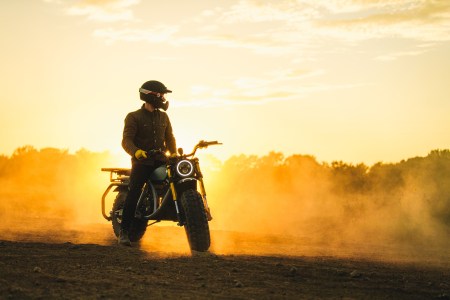
A pillion rider at the time, Ghazal was instantly hooked on the exhilaration of adventure riding and upgraded from an Jolta Electric Scooty to a Suzuki GD 110S the following summer. She clocked almost 200km in just more than a week of riding around Karachi before taking off in September in search of the ultimate adrenaline rush. Testing her limits, she headed solo to Shimshal Valley, becoming the first Pakistani woman to do so. For the uninitiated, Shimshal Valley Road is widely known as the second most dangerous road in the world. The episode wasn’t without its challenges, though — a nasty skidding accident put Ghazal a mere inches away from the edge of a rocky cliff.
“I almost fell off, but luckily, a Canadian friend who is also a biker was with me,” Ghazal says. “Coincidentally, she captured the whole thing on camera for a YouTube video. It was hard for her, too, because she took special permission from my father for us to take off together. And of course, I immediately pictured him when I fell. That memory will stay with me.”
Today, the 30-year-old continues to ride alongside her father and has become somewhat of an icon, her inbox flooded with messages from young girls wanting to learn how to ride. “You’ll inevitably hear stories of women facing hurdles when they travel, but you can’t let that deter you; you have to experience it on your own,” Ghazal says. “My trips have been amazing. Pakistan is a great place to visit. It is a safe place. And it’s up to people like me to portray its positives.”
Despite Ghazal’s best intentions, critics and trolls are typical when going against the grain in a conservative country like Pakistan, where females traveling alone or riding bikes still carries a stigma. “I faced backlash even riding my e-scooty to university,” she says. “A girl on a scooter was an unusual sight back in 2012. The mindset has evolved in recent years, though. Most of the reactions are now positive.”
Still, Ghazal is unfazed by all the attention, focusing instead on the support and encouragement of her father, who shares her love for travel. As a family, they’ve traveled far and wide, visiting countries like Canada, Thailand and Bangladesh.
“If it were up to her, she would ride to the top of K2,” Qazi says with a chuckle. “I’m very proud of her. And I trust her more than I trust myself. Sure, we’ve received critical comments from city people on occasion, but in these otherworldly places up north, she has never faced any issues. On the contrary, they’re always delighted to meet her and even ask for photos. They find her inspiring, which in turn motivates us.”
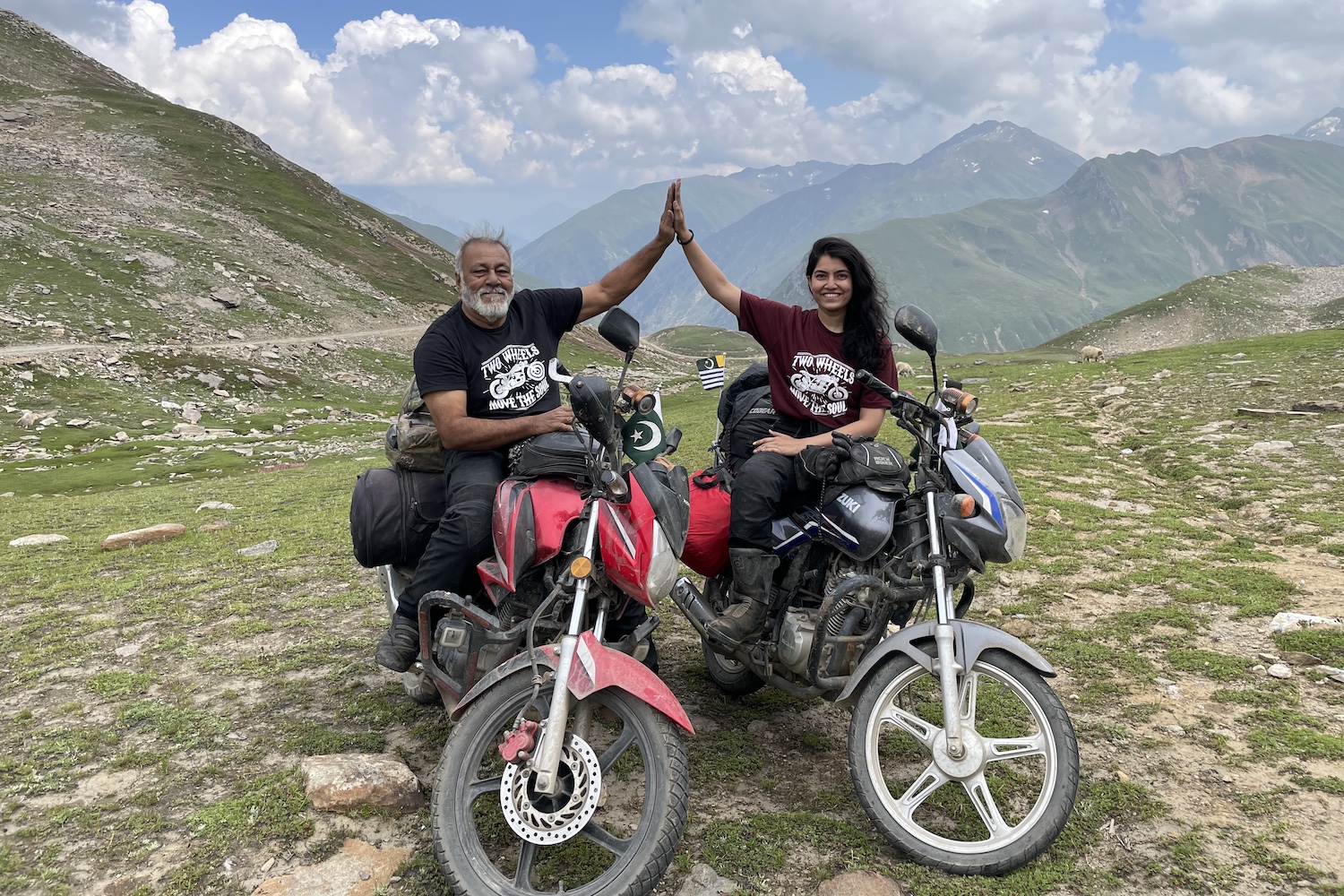
Qazi and Ghazal Farooqi
Their bond is not only special, but also palpable. Every now and then, Ghazal affectionately squeezes her father’s cheek, while he repeatedly steers the conversation in her direction. “I’m very lucky to have a father like him because it’s not common to see a father and daughter riding bikes across Pakistan — or any other country for that matter,” she beams.
Qazi, meanwhile, is vocally opposed to discriminating between boys and girls, between sons and daughters. “A daughter is a gift,” he says. “You must love her and respect her. And don’t impose your thinking on her, she has her own personality. As a parent, you should support her. This is your job.”
Interestingly, Ghazal has established a presence in another male-dominated field besides biking — she is an electrical engineer by profession. “Gender norms are slowly becoming a thing of the past in Pakistan,” she says. “We now have male makeup artists and fashion designers because the roles can be switched. And people should do what they love. I knew I wanted to be an engineer from day one and never took into account that it’s considered a masculine profession. Similarly, anyone can ride a motorbike. You just have to trust yourself and take the right safety precautions.”
As for what she has to say about young Pakistani women in general? “We are strong and confident, we can do anything we want, and we aren’t all that different from women abroad, despite factors like religion and culture,” Ghazal says. “Pakistani women are now pilots, mountaineers, cricketers. We, as women, are one.”
For more travel news, tips and inspo, sign up for InsideHook‘s weekly travel newsletter, The Journey.


